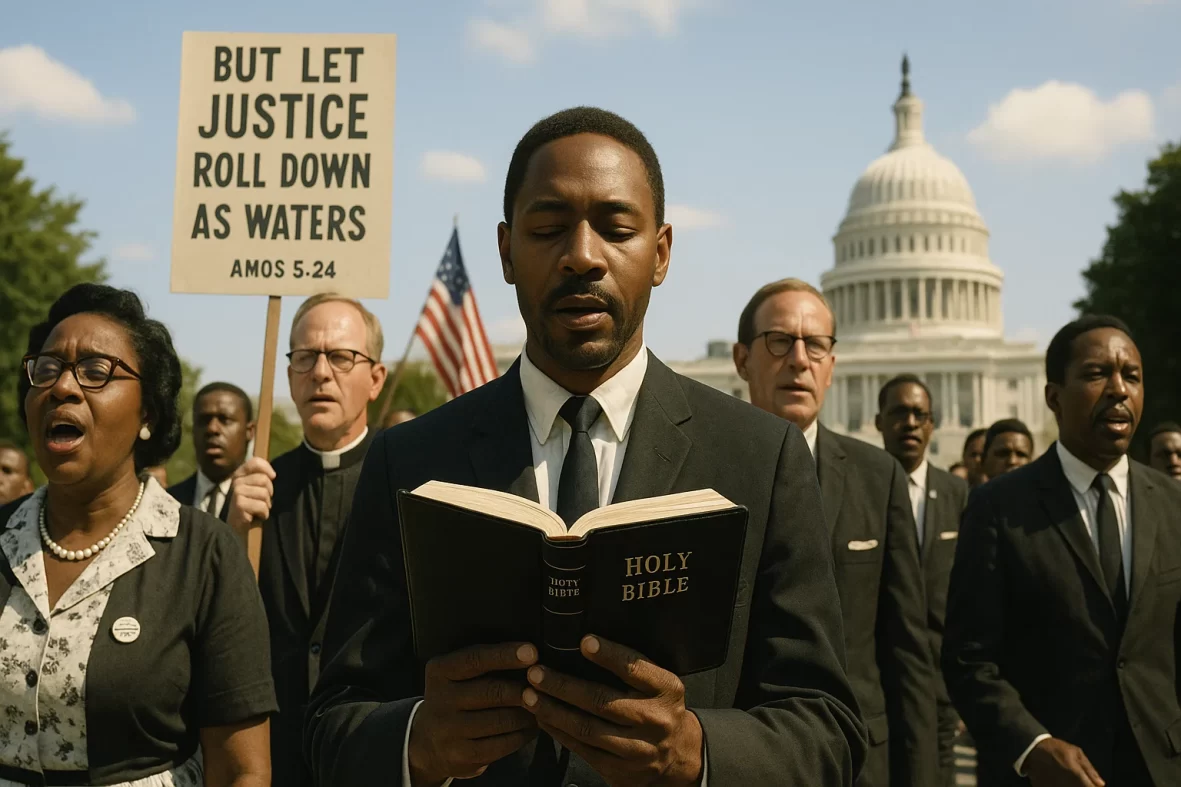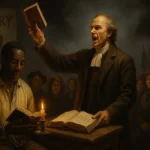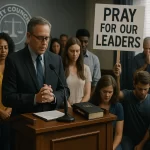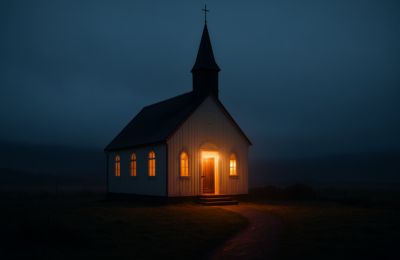Part 10 of Civic Theology: How the Bible Shaped America’s Founding and Freedom
The story of the American civil rights movement reads like a modern-day Acts of the Apostles, with Black preachers and congregations at the center of a holy uprising. From Greenwood in Mississippi to the Mall in Washington, ordinary believers lifted their voices in hymns and prayer as much as in march songs. A gospel choir’s triumphant harmony – “We shall overcome,” mouths pressed to microphones, eyes blazing with faith – was the soundtrack to a movement. By banding together in church basements and steepled sanctuaries, Black Christians formed the moral and logistical backbone of the struggle . Pulpit sermons on Sundays would translate into organizing meetings on Monday; verses about justice and mercy became marching orders in the streets. In Matthew’s words, they truly “bore one another’s burdens” (Gal. 6:2) – feeding, busing, and praying with each other – even as they lived out Christ’s law to serve “one of the least of these” (Matt. 25:40). Under sepia-toned banners and segregated lunch counters, ministers frequently knelt on courthouse steps in prayer, just as Jesus promised that whenever two or three gather in his name, He is in the midst (Matt. 18:20). As Al Sharpton later observed, “The Black Church was more than just a spiritual home. It was the epicenter of Black life.” In the 1950s and ’60s, there was literally no way to fight Jim Crow without the churches .
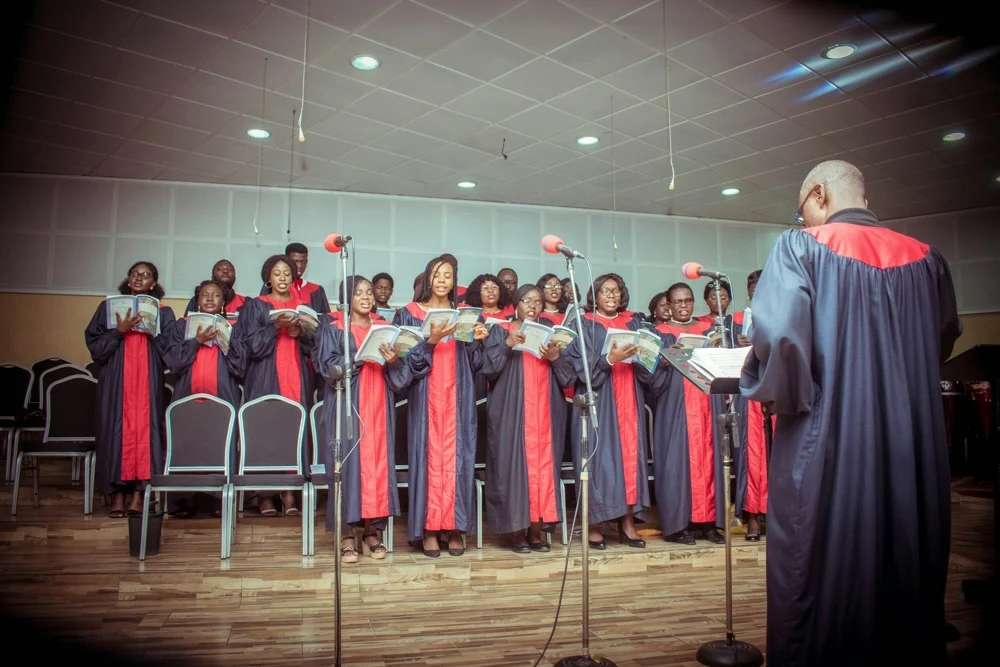
A gospel choir leads a congregation in song – echoing the spiritual zeal that fueled the civil rights marches. In those days the church functioned as an organizing hub, with sermons on righteousness turning quickly into strategies for action .
King’s Dream: Scripture in the Struggle
No pulpit spirit was more electrifying than Martin Luther King Jr.’s. King, the tall Baptist pastor from Atlanta, made every speech sound like a sermon on liberation. At the foot of the Lincoln Memorial in August 1963, he painted a prophetic “I Have a Dream.” He prefaced soaring civil rights rhetoric with a proclamation that the American nation would finally honor its creed: “Five score years ago…,” he intoned, “we brought forth on this continent a new nation…dedicated to the proposition that all men are created equal.” That phrase – “all men are created equal” – is not from the Bible but from the Declaration of Independence. Yet King immediately linked it to Biblical justice. He declared his dream by quoting Isaiah 40:4–5: “I have a dream that one day every valley shall be exalted, every hill and mountain shall be made low, the rough places will be made straight, and the glory of the Lord shall be revealed and all flesh shall see it together.” Then, lifting the crowd’s hope, he cited Amos 5:24: “Let justice roll down like waters and righteousness like a mighty stream.” The throng by the thousands responded in kind – mingling patriotic promise with prophet’s promise. In King’s vision of America, the “dream of social justice and racial equality was in harmony with God’s dream,” as one commentator put it .
King’s Letter from Birmingham Jail (1963) is another pulpit-on-paper where Scripture abounds. Written for eight white clergy who called his work “untimely,” it bursts with biblical allusion. King asks provocatively, “Was not Jesus an extremist for love: ‘Love your enemies, bless them that curse you, do good to them that hate you…’?” (Matt. 5:44) . By this, he marks himself an “extremist for love” just as Jesus was. And he demanded radical justice with another quote: “Was not Amos an extremist for justice: ‘Let justice roll down like waters and righteousness like an ever-flowing stream’?” . These challenges – asking if Jesus or Amos were extremists – flipped the insult of “extremist” back on King’s critics. He even invoked Paul’s scars as proof of the gospel’s cost: “Was not Paul an extremist for the Christian gospel: ‘I bear in my body the marks of the Lord Jesus’?” (Gal. 6:17) . And in a nod to the Declaration, he quotes Jefferson that “all men are created equal,” making it a moral, God‐given truth . In all this, Scripture is not window dressing; it is the marrow of King’s case. The Bible is literally his moral roadmap: King’s passion for nonviolence was rooted in Christ’s command to love enemies, and his vision of one nation threaded through Galatians 3:28 that in Christ “there is neither Jew nor Greek…male nor female, for you are all one in Christ Jesus” . In this way, King showed the movement’s faith by weaving together prophet and priest, dream and doctrine. He preached the cause of civil rights using the most sacred texts, as if each Shouting Sunday and Freedom March were an altar call for justice.
Government and Scripture:
A Nation Called to Justice
The fruit of the movement’s sermons was real legislation – often supported by government leaders who themselves invoked the same God-talk. President Lyndon B. Johnson, a Texan with an unlikely saint’s zeal, famously dedicated himself to civil rights. After the Selma marches in 1965 he delivered a rousing address to Congress, later titled “We Shall Overcome”. There he bridged Old Testament prophecy and American promise: Johnson declared that securing voting rights for Black Americans was “the issue of the day” that the nation must meet. He cast it as a moral imperative. In a passage of his speech, Johnson even cited Scripture by name. He quoted Luke 9:25 (though he did not announce the reference explicitly) to drive home the point: a nation that “seeks to gain the whole world, and yet loses or forfeits [its] very self,” had lost its soul . “If we fail,” Johnson warned, “the American dream will, in turn, become the American nightmare.” In the fervor of that moment he suggested the United States was a “chosen nation” with a divine purpose, recalling the vocabulary of prophets . National newspapers lauded it as a stirring call – one commentator declared, “We shall overcome” had “summoned into convocation all the majesty of this great government.” . That language of soul and salvation went far beyond dry politics. By invoking God’s word, Johnson transformed a legal debate into a sacred covenant: he made passage of the Voting Rights Act feel like keeping a promise under heaven .
Even the courts occasionally echoed scriptural ideas in their civil‐rights rulings. While Supreme Court opinions tend to quote Constitution and Common Law, a few justices have professed that the Founders’ creed of equality resonated with the Creator’s intent. One after Brown v. Board of Education noted that America’s one-time founders likened themselves to a “chosen people” under God, suggesting that racial segregation thwarted the divine plan of unity (Brown v. Board, 1954, concurring opinion). And in 1967’s Loving v. Virginia, Chief Justice Warren reminded the nation that our laws must be enlightened by moral truth – hinting that no earthly authority should outlaw love created by God. Above all, from the pulpit to the bench, the theme remained: freedom was a God-given aspiration, not a privilege to be rationed by man.
Betrayal and Bone:
When Scripture Was Twisted
Of course, the Bible’s witness was a double‐edged sword. Many segregationists like to say, as U.S. Senator Richard Russell complained, “God forbid we confess to the Negro that he is our equal.” All too often they did confess to scripture – but misused it. Preachers defending Jim Crow mined the Old Testament for curses (such as Genesis 9’s Curse of Ham) and repeated Paul’s injunction that slaves obey masters (Eph. 6:5), claiming these supported race laws. Even Jesus’ words were turned around. Ironically, bigoted ministers quoted John 8:32 – “the truth will set you free” – but said it to black people as if spiritual freedom alone sufficed, while keeping them chained by law. In courts and pulpits they pretended the Scripture insisted on separation and submission. King himself lamented that many white clergy had “monkey trials” in one hand and Klan hoodlums in the other, decrying direct action while using the Good Book to justify an “order” that was plainly unjust. He wrote in his letter that segregation was supported by “biblical” perversions: churches “deliberately waited” as Negroes suffered, then preached patience using selected verses. His retort was cutting: if these ministers were sincere about Scripture, they would speak up for freedom; instead, they “enlisted the church with social change,” he said, and then shied away when its “demands” became real.
In short, some folks used the Bible like a club against civil rights. It fell to King and others to show that they were the ones true to the Gospel of justice. King answered the abuse of Scripture by re-quoting the whole counsel of God: Isaiah’s vision of “swords beaten into plowshares”, Christ’s steady condemnation of human arrogance, the prophets’ roar against hypocrisy. He reminded everyone that the Spirit of the Lord came not to bless injustice, but to “loose the chains of injustice” and “let the oppressed go free” (cf. Isaiah 58:6). No spin could hide the fact that the Bible commands love for our neighbor (as Jesus taught) and cries out for righteousness on earth (as Amos and Micah declared). When segregationists turned Scripture into a tombstone for progress, King set the Bible back on its feet as a guide for living justice, not a justification for denying it.
From Selma to Today:
Continuing the March
The Civil Rights Movement did not end in the 1960s; it transformed into a broader struggle for the “beloved community.” Its spirit lives on in modern causes like Black Lives Matter and faith-based immigration reform. These movements, too, claim a biblical heritage: the cry “Black lives matter” echoes Galatians 3:28’s insistence that in Christ every life has equal worth. Advocates for immigrant rights often invoke Leviticus 19:34 and Matthew 25:35 (“I was a stranger and you welcomed me”) to demand compassion across borders. In churches across the country, sermons on justice now cite King along with the Beatitudes.
But how do today’s ideologies stack up against God’s ancient blueprint? Many of our contemporary debates are framed in terms unfamiliar to King and his generation: expressive individualism, identity politics, and critical theory. American culture today often emphasizes “living one’s truth” and claims autonomy over personal identity. Critical race theory, for example, sees society through lenses of power and oppression, labeling injustices in terms of systemic categories. These ideas do highlight real problems, but they can depart from Scripture’s approach. The Bible never idolizes the self above the community (the sin of Babel was “making a name for ourselves”, Gen. 11:4). Nor does the Bible build its vision of justice on shifting group identities. Instead, its foundation is creation and covenant. Creation: every human is made in God’s image (Gen. 1:26–27), so no life is disposable or greater than another. Covenant: God repeatedly commands care for widow, orphan, and foreigner (Exod. 22:21; Deut. 10:19; etc.), grounding justice not in ideology but in holy agreements. And Kingdom: the prophets and apostles envisioned a society under God’s reign, where righteousness flows from the throne (Amos 5:24) and every ethnic group eventually joins the worship (Rev. 7:9-10).
In these ways, biblical justice is more stable than the wind of current politics. It says: We are not ultimately defined by our race or gender or the politics of the day, but by our image-bearing in God, our new birth in Christ, and the eternal covenant of grace. That is why many believers can welcome Black Lives Matter’s aim to end violence, yet stop when it elevates certain philosophical assumptions above biblical truths. That is why Christian immigration reformers insist that reaching out to immigrants flows from God’s law, even if some activists reject borders entirely. The crucial contrast is this: modern movements often point to power structures or feelings to decide right from wrong, whereas Scripture points to God’s character. True justice, the Bible teaches, comes from imitating the just God, who is love, who gives crops to the field by merely smiling on seeds (Jonah 4:11), and who offers mercy to the oppressed.
The March Continues:
A Christian Charge
Christian brothers and sisters, the story is not over. The Apostle Paul wrote that “love is the fulfilling of the law” (Rom. 13:10) – and what is justice if not love’s long arm stretched around a hurting world? We must keep pressing on the march of freedom, armed with the only power that truly sets captives free: the truth of the Gospel. Press on as creative extremists for Christ’s kingdom, as King put it , choosing love, not hate; choosing justice, not injustice . Press on knowing that the long arc of history does bend toward justice, because it bows under the weight of a Judge who is both righteous and gracious (Habakkuk 1:13).
Yet let us walk with both hope and humility. While politics rage, we preach a greater Kingdom. Our hope is not in laws alone, but in the God who inspired every true prophet. We recall that Galatians 6:9 says: “Let us not grow weary of doing good,” for in due season we will reap if we do not give up. With dry wit we might note that some things move at a horse-and-buggy pace – and others move by prayer. But move we will, by the grace of God and the example of those who ran this race before us.
History and Scripture both demand that God’s people care about freedom. As Charles Spurgeon once said, “Sin will spread like a cancer unless the surgeons remove it.” The Civil Rights era reminds us that the Church must be that surgeon, pain and all. Let our pulpits still thunder truth, and our hands feed and free the oppressed. In the pages of Scripture and the streets of Selma we see the same promise: the oppressed go free, injustice is toppled, and God’s covenant triumphs.
Now, as then, America’s conscience still listens for the echo of Gospel justice. So let us speak boldly, pray earnestly, and act compassionately, “bearing with one another and, if one has a complaint against another, forgiving each other” (Col. 3:13), even as we confront society’s sins. With King we declare: the dream is not dead – it lives in Christ, and he is our hope of glory (Col. 1:27). So press on, beloved, in the public square and beyond. The Lord who called us is faithful; let us show His love in deeds. The march of freedom goes on – and its music will always be the beautiful harmony of justice, mercy, and faith working in love (Micah 6:8; Gal. 5:14).
References
Pauley, G. E. (2008). Johnson’s Voting Rights Address (March 15, 1965). Voices of Democracy, 3, 17–33.
Penningroth, D. C. (2024, January 13). Lessons from MLK’s Fight to Mobilize the Black Church. TIME.
Los Angeles Public Library, Social Science Dept. (2024, January 12). Martin Luther King, Jr. & The Black Church: A Legacy of Prayer and Power.
Taylor, J. (2017, January 16). Reading King’s Letter from Birmingham Jail. The Gospel Coalition.
White, L. (n.d.). 4 Bible References in MLK Jr.’s “I Have a Dream” Speech. Beliefnet.
Want to explore further?
Dig Deeper in to Civic Theology



